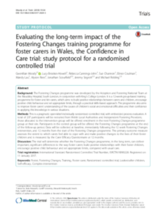Displaying 1341 - 1350 of 2221
This randomised controlled trial will evaluate the Fostering Changes programme in Wales, a 12-week group-based training programme for foster and kin carers.
This paper presents findings from an 18-month randomized controlled trial in which intact families (N = 122) with at least one CPS report were provided with a facilitated connection to a paraprofessional evidence-based HV program or usual care services from child protection.
Providing relative caregivers the same financial benefits and supports as nonrelative foster caregivers is the focus of ongoing US federal litigation described in this article from the Child Law Practice Today July/August 2017 Issue on Kinship Care. The litigation addresses the equitable treatment of relatives who care for children in the child welfare system.
In this article from the Child Law Practice Today July/August 2017 Issue on Kinship Care, Los Angeles Judge Michael Nash, Ret. shares court and agency strategies to engage and support relatives for children and families involved in the child welfare system in the US.
This article from the Child Law Practice Today July/August 2017 Issue on Kinship Care explores kinship care in the US, including its benefits to children and families.
The current study tests the ‘overburdening’ hypothesis that examines whether taking on the demands of work and school at the same time could overwhelm and actually hinder the healthy development of youth as they transition from foster care.
This article from the Child Law Practice Today July/August 2017 Issue on Kinship Care summarizes seven steps to create a kin-first culture—one in which child welfare stakeholders consistently promote kinship placement, help children in foster care maintain connections with their families, and tailor services and supports to the needs of kinship foster families.
This sudy sought to deepen understanding of the underlying patterns of services receipt of the John F. Chafee Foster Care Independence Program (CFCIP) to prepare for youth’s successful transition to adulthood. The authors used multi-level latent class analysis (MLCA) to identify underlying combinations of service receipt that may be influenced by youth-level and state-level characteristics.
The present study examined whether the prospective association between cumulative pre-adoptive risk (e.g., maltreatment, age at placement, foster placement instability, ever having lived with birth parent) and adolescent/young-adult substance use was mediated by childhood internalizing and externalizing problems in youth adopted from foster care.
This paper focuses on understanding how the key stakeholders of the foster care system work together, as well as the systems that facilitate collaboration.

